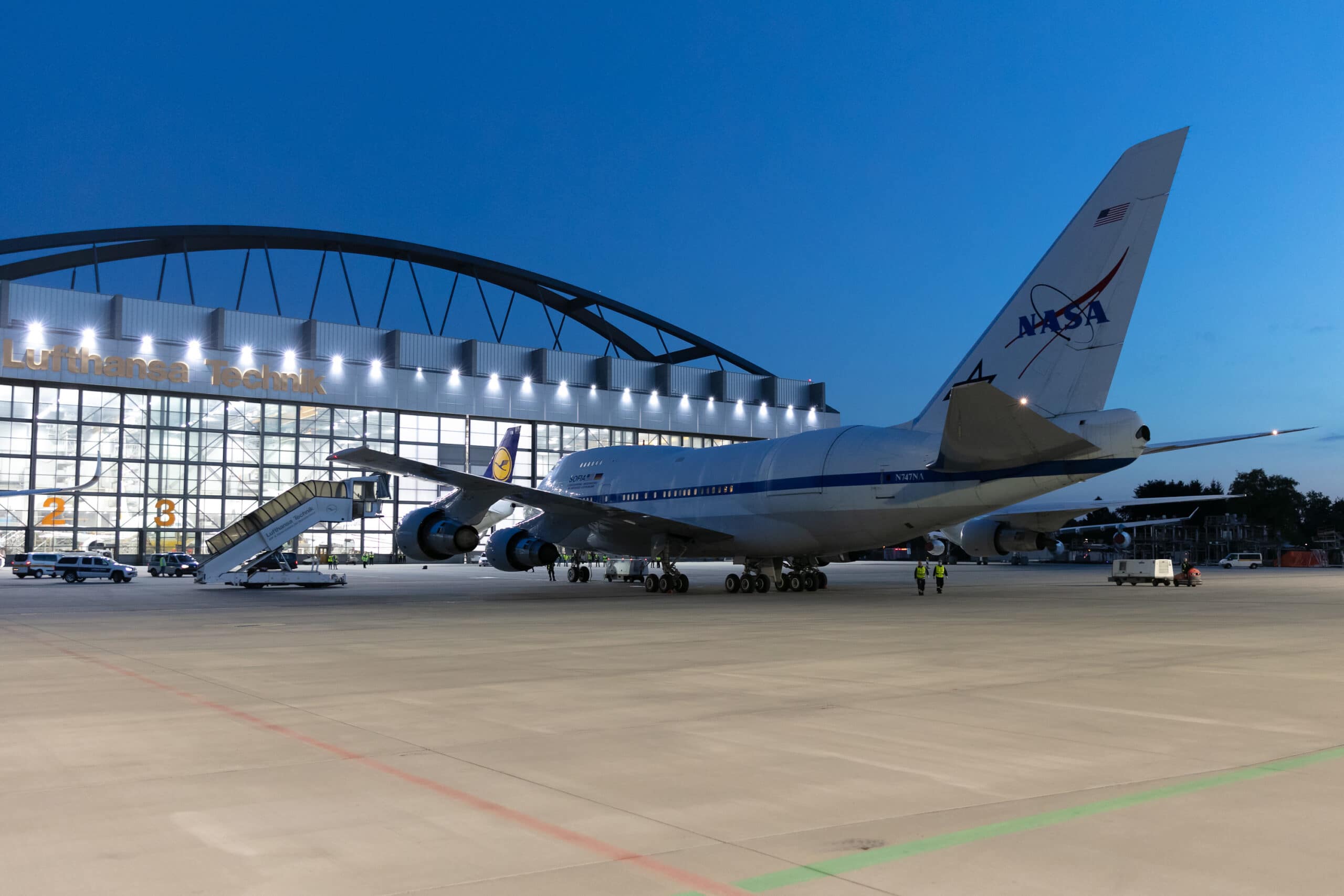SOFIA (Stratospheric Observatory for Infrared Astronomy), a modified Boeing 747SP, is due for another “pit stop”: For a routine check at Lufthansa Technik, the flying observatory of the US space agency NASA and the German Aerospace Center (DLR) landed at Hamburg Airport on 30 September 2020. During this layover, which is equivalent to a C-check taking place approximately every three years, the Boeing 747SP is put through its paces.
“We are looking forward to the renewed cooperation with Lufthansa
Technik,” says Heinz Hammes, SOFIA Project Manager at DLR’s Space Administration branch. “The special circumstances this year require cooperation and increased flexibility from all parties involved. We are convinced that we are in the right place for the tasks ahead.”
New Air Conditioning for the Research Instruments
In the special case of SOFIA, the aircraft will be repaired in
accordance with NASA regulations, which also defined the exact work
packages for this layover. During the extended maintenance visit the
aircraft structure undergoes extensive inspections before necessary
repairs are carried out. Therefore, engines and cabin, including the
panelling and floors, are removed in order to be able to subsequently
carry out the test and maintenance work and to check all cabling and
ducts.
In addition, the air conditioning system is given an upgrade. “This
will enable us to adjust the temperature in the cabin very finely in
future,” explains Hammes. “This is particularly important in the
instrument zone, because every research instrument requires a
precisely fitting ambient temperature.”
The final checks at Lufthansa Technik – for instance on the engines
and the cabin’s internal pressurization – are scheduled for
mid-December. The maintenance work should be completed by the
beginning of February when SOFIA should resume its scientific
operations.
University of Stuttgart Carries Out Telescope Maintenance
The telescope on board of SOFIA, the German contribution and the
heart of the observatory, will also be thoroughly overhauled during
its stay at Lufthansa Technik. This work will be carried out
exclusively by the staff of the German SOFIA Institute (DSI) at the
University of Stuttgart, who are very familiar with this globally
unique system. “With this extensive maintenance, we pay particular
attention to those work packages that, due to their complexity, are
only carried out every three or six years,” says Michael Hütwohl from
DSI, who is responsible for the telescope at SOFIA. “Moreover, a
large number of smaller jobs, from the inspection of the 2.7 meter
primary mirror to software updates of the electronic telescope
systems, are also on the agenda.”
Exceptional Cooperation
At present, more than 10,000 working hours are already earmarked for the scheduled work alone, so that the activities of all those
involved must be well coordinated. “In 2014 and 2017 we have already experienced an exceptionally good cooperation with our colleagues from DSI, DLR and NASA and we are now looking forward to continuing this cooperation,” says Sven Hatje, the project manager at Lufthansa Technik responsible for SOFIA’s C-Checks. “It is great that we can now welcome SOFIA back again.”
Unlike SOFIA’s other visits to Hamburg, this time its scientific
instrument (GREAT – German REceiver for Astronomy at Terahertz
Frequencies) is mounted on the telescope. It will be disassembled
after landing and brought to the Max Planck Institute for Radio
Astronomy in Bonn for maintenance and optimization.
Special Safety Precautions for Coronavirus Pandemic
All work on the aircraft is carried out under strict safety precautions due to the global coronavirus pandemic. Both Lufthansa Technik and NASA have developed and coordinated comprehensive procedures for working in and on the aircraft. These include the rule that no more than 15 people may be on board at at the same time. The technicians are also obliged to wear a mouth-and-nose protection during the entire work, and only the absolutely necessary personnel have access to the aircraft.
